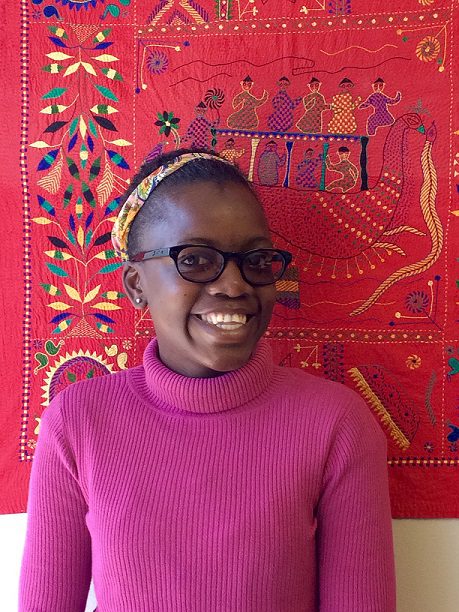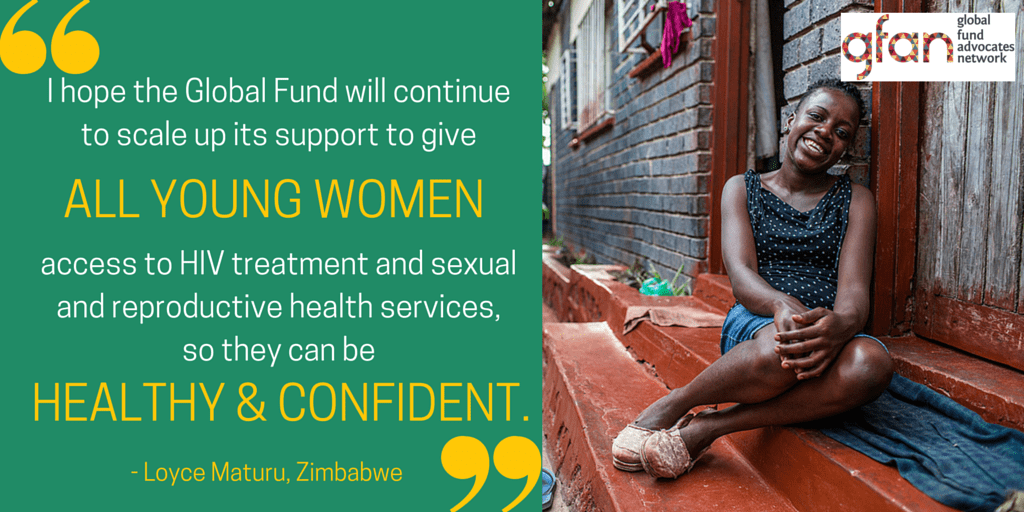March 31, 2016
In 2000, Loyce Maturu (@MaturuLoyce) lost her mother and younger brother to AIDS and tuberculosis (TB) within the same week. Now the 24-year-old TB survivor and HIV peer educator works in advocacy in her home country of Zimbabwe. Loyce sat down and spoke with Friends about her story during her trip with RESULTS to Washington for World TB Day.

Friends: Thank you for speaking with us today. Can you please tell us about your experiences with TB and HIV?
Maturu: In 2004, I started to get sick and was coughing a lot. My aunt knew how my mother and brother had passed away, so she went with me to the clinic and got me tested. I found out that I have HIV and I also had tuberculosis.
I cried, and I really felt depressed. I thought it was the end of me.
In that same year, I managed to get access to tuberculosis treatment at a Global Fund-supported clinic in Zimbabwe. The treatment took about six months. It was really difficult going through the tuberculosis treatment because there were so many pills I had to take, and there were a lot of side effects like loss of appetite and feeling dizzy.
By that time, I was an adolescent, and I was trying to accept the condition that I am going to have HIV for the rest of my life. Considering the kind of stigma that existed, and the number of tuberculosis pills I had to take, it was really depressing for me.
Being HIV-positive and having to take tuberculosis medications is really a double burden. As someone who has been on tuberculosis treatment, I am motivating peers and sharing my experiences with them and building their confidence.
Friends: What differences do you see in the type of stigma experienced by adolescents versus adults in the community?
Maturu: In 2004, I didn’t know anything about HIV, AIDS or tuberculosis. At the time I was told I have HIV and tuberculosis, so many people were dying because there was not a lot of coverage for services or treatment. And so many people did not want to come out in the open even if they were not feeling well. They would not go to the clinic because of the stigma that is related to the diseases. Because I was an adolescent when I got to know my status, I had to stop school for some time. You start getting low grades in school, and that’s how it affects adolescents differently than adults. It also impacts what you want to do in life and your economic status in the future. When I didn’t do well in school, it was a really hard time for me.
Friends: How else do having HIV and TB impact daily life?
Maturu: It’s beyond being given treatment. Because there is a lot of stigma, people need to be motivated. We need to support people with tuberculosis and HIV. Having been a peer counselor going on home visits on a daily basis, I also saw the different challenges my peers were facing, so it truly motivated me. For me to be taking my medication, my peers are always my motivation.
Also, when adolescents have multidrug-resistant TB (MDR-TB), it becomes a huge challenge. Not all clinics provide treatment for MDR-TB. People in certain communities may need to travel, but you need money for transportation to go to another clinic. It becomes a challenge in terms of access.
Friends: What message resonates with your peers in helping them face this situation and get through it?
Maturu: People say bad things about people with HIV – and most of the time when you have tuberculosis, people think you have HIV. Negative messages that if you’re HIV-positive, you can’t achieve anything in life, you can’t go to school. So when communicating with my peers, I always make sure that I tell them that I have gone through the same thing, and I’ve made it through.
Being HIV-positive doesn’t mean that it’s the end of the world. HIV is in the blood, and not in the brain to make you stop thinking, or stop thinking normally. You can do anything because HIV doesn’t affect your brain.
Friends: What do you want people in the United States to understand about what it’s like to live with these diseases, particularly in Africa?
“Please trust and believe in adolescents, not only as beneficiaries, but as agents of change”
Maturu: Tuberculosis really is one of the most infectious, killer diseases. There is a greater need for awareness about how tuberculosis should be the number-one global priority. For policymakers, my message is to please trust and believe in adolescents, not only as beneficiaries, but as agents of change to make sure that laws or strategies better address issues that affect adolescents and young people so that we can end the epidemic. If you don’t listen or give a chance to young people to be part of the policymaking processes, then you are never going to go anywhere because at the end of the day, you’re going to think for us.
Friends: Over the past few years, what changes have you seen, and what changes do you think have been positive?
Maturu: The Global Fund has taken a really good stance in making sure that adolescents are a priority. Before, we were piled with the adults, but now there is a straightforward focus on adolescents and young people and, in particular, adolescent girls and young women, which is a really good thing. I’m so happy that adolescents also took part in the new strategy that the Global Fund is in the process of finalizing. That is a positive thing, in terms of investing for adolescents’ services, treatment, access or retention. So, that’s the most amazing thing that I have seen.

